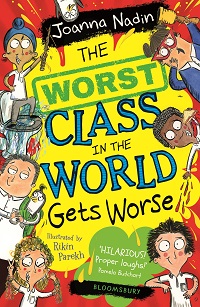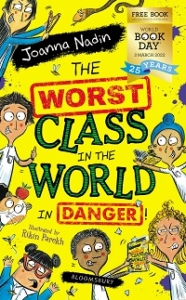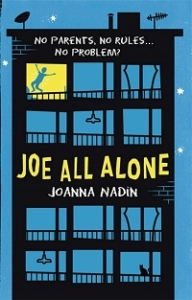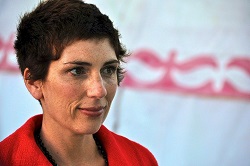
Authorgraph No.253: Joanna Nadin
Joanna Nadin interviewed by Joy Court
Who would have thought that a career as a political speech writer would be such a good preparation for writing for children and young people? It would not have occurred to me before my delightful conversation with Joanna Nadin, currently riding high on having a World Book Day book this year, something she describes as, ‘one of the things that, as an author, you dream of, like getting a Blue Peter badge!’ The Worst Class in the World in Danger is the fourth title in this highly successful series, with a further title in the pipeline, because she loves ‘to come up with more mayhem for Manjit and  Stanley to get involved in’. As a series these books are particularly successful with new or struggling readers and not just because they are so funny. We discussed how they shared with her earlier Penny Dreadful series, the structure of short stories within a single volume, each story able to stand alone and be read in any sequence. Each story is the perfect length for bedtime reading too, and she has learnt not to use long sentences which are tricky to read aloud. Every Worst Class series book begins with the same introductory jokes and character description and dialogue catchphrases are repeated throughout. Little did I know that these are not just good strategies for emerging readers, they are speechwriting tricks! Skilful rhetoric often involves repeating phrases and the use of alliteration and anaphora, where sentences begin with the same set of words, are all aids to comprehension and retention in fiction or politics.
Stanley to get involved in’. As a series these books are particularly successful with new or struggling readers and not just because they are so funny. We discussed how they shared with her earlier Penny Dreadful series, the structure of short stories within a single volume, each story able to stand alone and be read in any sequence. Each story is the perfect length for bedtime reading too, and she has learnt not to use long sentences which are tricky to read aloud. Every Worst Class series book begins with the same introductory jokes and character description and dialogue catchphrases are repeated throughout. Little did I know that these are not just good strategies for emerging readers, they are speechwriting tricks! Skilful rhetoric often involves repeating phrases and the use of alliteration and anaphora, where sentences begin with the same set of words, are all aids to comprehension and retention in fiction or politics.
In a far cry from the usual scenario of an author with childhood dreams of being a writer, this former broadcast journalist’s career as a children’s author began when she was a special adviser to the Prime Minister and, on a boring day in her basement office at Number 10, came across a BBC competition for children’s story writing. Tellingly she had never considered that being an author was an actual job she could do. Authors were ‘old posh men’ like the Roald Dahl she had met in her Puffin Club youth. But, having completed her story, she then sent the manuscript out to every publisher and agent listed in the Writers and Artists Yearbook and subsequently watched the rejections pile up. But one agent, Sarah Molloy, and one publisher, Walker Books, invited her in for a chat and her highly successful and varied writing career took flight.
She has since won the Fantastic Book Award and the Surrey Book Award, been shortlisted for the Hearst Big Book Awards, the Roald Dahl Funny Prize, a BookTrust Best Book Award and Queen of Teen, and twice been nominated for the CILIP Carnegie Medal. Nonetheless, she took to heart the advice of her agent and has never given up the day job. After taking her PhD at Bath Spa, she now has her dream job of lecturing in Creative Writing at Bristol University, but nevertheless has been able to publish over 70 titles for children, teenagers and adults, writing in her ‘spare time’.
Perhaps the only suggestion from her agent that she did not pursue, was to ‘write something with vampires’ for teens. Given that this was in pre-Twilight days, it might have paid off, but she has never been tempted into fantasy. ‘Why spend all that time and energy conjuring up a different world when there is so much to say about this one?’ Instead, inspired by the way The Secret Diary of Adrian Mole had reflected her own teen experience, she thought she could write a female version for a new generation and so another very successful series was born. The seven Rachel Riley Diaries follow the comedic narrator’s tragically normal teen life in small-town Essex. These are based upon Jo’s own home town (Saffron Walden), her friends, and her own family. ‘I didn’t even change my brother’s name!’ she confesses. Hilarious, but with an unmistakable honesty, the stories deal with issues including bullying, based on her own experiences. She is very touched by the feedback from readers whose mental health has been helped by being able to laugh and it annoys her (and me) that ‘people think funny books are not clever… or not as nourishing as literary books… it is hard to write funny.’
She considers herself fortunate to be considered a ‘safe pair of hands’ and to attract commissions from publishers. Her reputation for delivering manuscripts on time, for being willing to be edited, all stem from her earlier career; ‘when you have had the Prime Minister’s red pen on your work, you lose your ego!’
She has written for reading schemes published by Bloomsbury, Oxford Reading Tree, Pearson and Collins and relishes the challenge of a ‘carefully crafted sentence’. She would love to do more nonfiction like her recent biography of Alan Turing because ‘You don’t have to come up with a plot.’ Qualifying that, she adds ‘It’s not easy. You do have to do loads of research and you’ve still got to make it readable and thrilling and find the right voice.’ Finding the right voice and research (into cycling) was also key to co-writing the Flying Fergus series with Sir Chris Hoy and again, there are parallels with her speech writing. ‘Ghost writing is essentially what I had been doing for years in writing speeches – pretending to be someone else.’ But she loves the process of writing in partnership, because writing ‘is usually such a solitary activity’. So, although the experience could not have been more different, the joint authorship with Anthony McGowan of the Carnegie nominated Everybody Hurts, where they each narrated a character in a funny and touching romance, was ‘an absolute joy’ as well as a technique she had always wanted to try.
 She is also very grateful that all her contracted series and titles, along with her day jobs, have given her the freedom to write books like the Carnegie nominated Joe All Alone and her latest full-length novel, No Man’s Land, books she felt compelled to write. The first draft of Joe All Alone was completed in just over two weeks, inspired by seeing ‘a kid in his mid-teens with a sleeping bag on his back, just like a snail, and realising he was homeless and wondering how you end up like that.’ Similarly, No Man’s Land was fuelled by anger and a sense of urgency arising from the Brexit fallout and the rise of Trump and from frustration at no longer being involved in politics. Technically the dystopian novel she vowed never to write, it powerfully imagines our world as it could be in just a few years, with the UK (Albion) now in the grip of the far right and on the brink of war. She believes words ‘can and do change the world’ and that hopefully stories like these will form ‘part of the consciousness of young readers so that when they are older, they will do things differently.’
She is also very grateful that all her contracted series and titles, along with her day jobs, have given her the freedom to write books like the Carnegie nominated Joe All Alone and her latest full-length novel, No Man’s Land, books she felt compelled to write. The first draft of Joe All Alone was completed in just over two weeks, inspired by seeing ‘a kid in his mid-teens with a sleeping bag on his back, just like a snail, and realising he was homeless and wondering how you end up like that.’ Similarly, No Man’s Land was fuelled by anger and a sense of urgency arising from the Brexit fallout and the rise of Trump and from frustration at no longer being involved in politics. Technically the dystopian novel she vowed never to write, it powerfully imagines our world as it could be in just a few years, with the UK (Albion) now in the grip of the far right and on the brink of war. She believes words ‘can and do change the world’ and that hopefully stories like these will form ‘part of the consciousness of young readers so that when they are older, they will do things differently.’
Joe’s story went on to be turned into a Bafta award winning children’s TV serial, which was a ‘wonderful and amazing experience to actually see the people who lived in your head’. Currently Joanna is working on a historical YA novel, ‘a 1920s Bridget Jones Diary’, working on a TV script and planning a middle grade novel about climate change, all of which demonstrates that the supply of creative, thoughtful, stimulating and funny books from this highly talented and enviably productive author, thankfully shows no sign of diminishing.
Joy Court is Reviews Editor for The School Librarian and Past Chair of the CILIP Carnegie and Kate Greenaway Medals.
Books
The Worst Class in the World series, ill. Rikin Parekh, Bloomsbury
Penny Dreadful series, ill. Jess Mikhail, Usborne
Rachel Riley Diaries, Oxford
Alan Turing: A Life Story, Scholastic, 978-1407193199, £5.99 pbk
Flying Fergus series, with Sir Chris Hoy, ill. Clare Elsom, Piccadilly Press
Everybody Hurts, with Anthony McGowan, Atom, 978-0349002910, £7.99 pbk
Joe All Alone, Little Brown, 978-0349124551, £6.99 pbk
No Man’s Land, UCLan Publishing, 978-1912979615, £7.99 pbk






